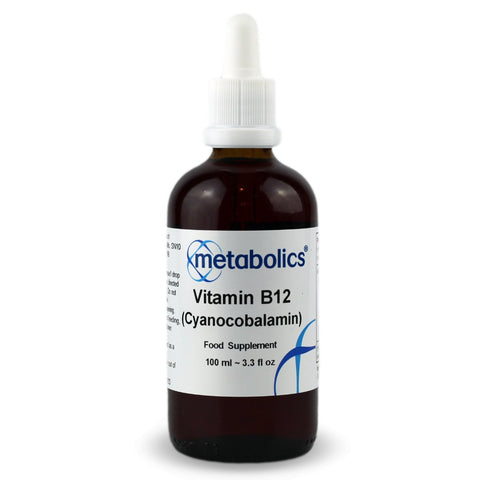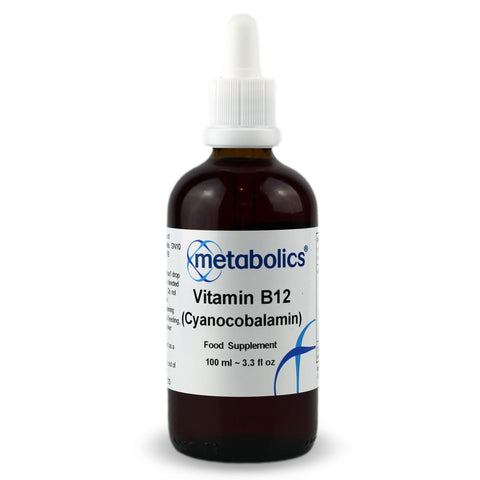Suitable For
Humans need 13 different vitamins to sustain life and health. If we do not take in enough of a particular vitamin our bodily supplies decrease and a deficiency ensues.
Of the 13 vitamins our bodies need, one is B12. It is unique because it is the only vitamin that cannot be obtained from plants or sunlight (as plants do not need B12, so do not produce or store it), it is produced by bacteria in the gut of animals and absorbed in the small intestine. Therefore to obtain B12 from the diet you need to eat animal products - meat, fish or dairy products. However even a diet high in these foods may not supply enough B12. In fact it is remarkably easy to become deficient in B12 as many people can neither absorb nor use B12. Vegans and vegetarians are particularly prone to deficiency. The route that B12 takes from the mouth to the blood is complex and there can be problems at any point.
What does Vitamin B12 do?
- It contributes to the reduction of tiredness and fatigue
- It contributes to normal energy yielding metabolism
- It contributes to normal functioning of the nervous system
- It contributes to normal red blood cell formation
- It has a role in the process of cell division
- It contributes to normal homocysteine metabolism
- It contributes to normal psychological function
- It contributes to normal functioning of the immune system
The steps of the B12 pathway are:
- Food containing B12 is bound to animal proteins and needs to be freed. So when the food reaches the stomach it is split by an enzyme Pepsin (produced in the stomach only if sufficient amounts of Hydrochloric acid are present.)
- The stomach also produces Intrinsic Factor (IF), a protein that is needed later in the pathway.
- Other proteins known as R-Binders carry the B12 into the small intestine.
- In the intestine, Intrinsic Factor (from the stomach) attaches itself to the B12 and transports it to the last section of small intestine, the ileum. The cells lining the ileum contain receptors that grab onto the B12-Intrinsic Factor complex and drag it into the blood stream.
- In the bloodstream, another protein, transcobalamin2 carries the Vitamin B12 to all the cells in the body, transporting any extra to the liver for storage.
Deficiency of Vitamin B12
There is no one particular symptom that suggests a B12 deficiency. Symptoms may depend on the age and genetic disposition of the individual, and also the length and severity of deficiency. Because Vitamin B12 has so many functions, including the health of nerves, brain, blood and immune system, as well as the formation of DNA, B12 deficiency can impair functioning in almost any part of the body. The following signs and symptoms are common symptoms of B12 deficiency but can also arise from other causes.
Mental changes include irritability, apathy, sleepiness, paranoia, personality changes, depression, memory loss, dementia, hallucinations, violent behaviour and in children developmental delay and/or autistic behavior. Neurological signs and symptoms include pain, tingling or numbness, decreased sense of touch, pain or temperature, weakness, loss of awareness of body position, clumsiness, tremor, symptoms mimicking Parkinson’s disease or multiple sclerosis, spastic muscles, incontinence, paralysis, visual changes and damage to the optic nerve. Vascular changes include, transient ischaemic attacks (TIAs or mini strokes), CVA or stroke, coronary artery disease, heart attack, congestive heart failure,
palpitations, low blood pressure when standing causing fainting, deep vein thrombosis (blood clot in the arm or leg) and pulmonary embolism.Other signs and symptoms may include shortness of breath, generalised weakness, chronic fatigue or tiredness, loss of appetite and weight loss, epigastric pain (poor digestion, full or bloated feeling after eating normal or small meals), diarrhoea or constipation, increased susceptibility to infection, poor wound healing, failure of new born to thrive, tinnitus, vitiligo (white patches of skin), or hyperpigmentation, premature grey hair and impotence.Anybody at any age can become deficient but people may be at an increased risk if they are:
- Vegans and vegetarians.
- Over 60.
- Have eating disorders such as anorexia or bulimia.
- Take antacids or diabetes related drugs that may interfere with B12 absorption.
- Have a history of alcoholism.
- Have a family history of pernicious anaemia.
- Are diagnosed with anaemia.
- Have Crohn’s disease, irritable bowel or any disease causing malaborption of nutrients.
- Have an autoimmune disease, type 1 diabetes, SLE, Addison’s disease.
- Women with a history of infertility or multiple miscarriages.
- Infants born to women or breast fed by women who are already deficient or at risk of B12 deficiency.
All forms of B12 are stable when protected from the light. Light exposure cleaves the cyanide with the production of hydroxycobalamin. The B12's have an optimal stability at a PH4.00-4.5, even at higher temperatures. In the presence of acid or alkaline mediator the presence of reducing agents such as ascorbic acid, the vitamin is destroyed to a greater extent. It is therefore advisable that B12 is not to be taken with fruit juice.
Supplement Facts
1 drops contains
%NRV*
Vitamin B12
98 mcg
3920%
† Nutrient Reference Value (NRV*) not established
Ingredients
Directions / Dosage
 Liquid
Liquid
Warning
Storage
Product Type






